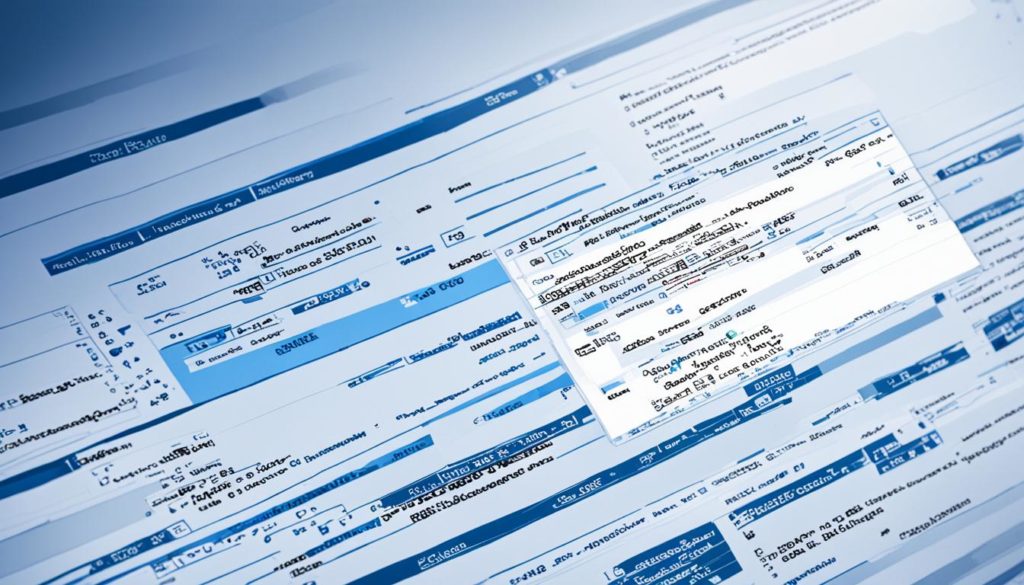
Did you know that over 90% of Fortune 500 companies use SQL for database management? This fact highlights SQL’s importance in the business world today. But, when it comes to SQL query languages, there’s confusion between SQL vs T-SQL. SQL is the standard language for databases, while T-SQL is a special extension for Microsoft SQL Server. Let’s look into how SQL and T-SQL differ in purpose, design, and application.
Key Takeaways
- SQL is a standard query language used universally across various database types.
- T-SQL is an extension of SQL specifically for Microsoft SQL Server, enhancing SQL functionalities with proprietary features.
- Understanding the differences and similarities between SQL and T-SQL is essential for data-centric careers.
- SQL is open-source, while T-SQL is proprietary to Microsoft.
- Differentiating factors include design orientation, execution methods, and syntactic variations.
- Choosing between SQL and T-SQL depends on professional goals and the tech environment of your workplace.
What is SQL?
SQL stands for Structured Query Language. It was created in the early 1970s by Donald D. Chamberlin and Raymond F. Boyce at IBM. This language is for managing and working with relational databases. Today, SQL is a key language for database management in many industries.
Origin and History
SQL was developed in the 1970s at IBM. Its goal was to standardize how databases are managed. It was first called SEQUEL but got shortened to SQL. Over time, SQL has become essential for databases like MySQL, Oracle, and Microsoft SQL Server. It’s very popular, consistently ranking in the top 20 programming languages.
Key Features and Usage
SQL is great for working with data. Its key features include:
- Data Retrieval: You can pull specific information from databases with SELECT statements.
- Data Manipulation: It lets you add (INSERT), delete (DELETE), and change (UPDATE) data.
- Data Definition: You can create and modify database schema with CREATE and ALTER statements.
- Data Control: SQL helps define who can access data through GRANT and REVOKE statements.
Companies like Google and Amazon use SQL because it’s powerful for querying and managing data.Learn more about SQL features
Advantages and Disadvantages
Knowing SQL’s pros and cons helps use it effectively. Here’s what to consider:
- Advantages:
- Many databases like MySQL are open-source, so SQL is widely accessible.
- Works with different database systems, including Oracle and Microsoft SQL Server.
- Its declarative nature means you just say what you want, not how to get it.
- SQL ensures data is reliable and accurate through integrity constraints.
- Disadvantages:
- With very large datasets, performance can drop.
- For some complex queries, SQL might lack flexibility.
- Switching between different database systems can be hard due to “vendor lock-in.”
Even with challenges, SQL is crucial for database experts. Its wide use and compatibility highlight its significance. Knowing SQL well means you can do more in database applications.
What is T-SQL?
Transact-SQL is often called T-SQL. It’s designed specially for Microsoft SQL Server databases by Microsoft. It adds powerful features not found in basic SQL. These features make it great for managing data and handling business logic in big applications.
Origin and Development
T-SQL was born from Microsoft’s need to improve SQL for its ecosystem. It started with a partnership with Sybase. Over time, T-SQL has grown. Now, it lets users create complex tasks with program blocks, functions, and procedures. It works well with other Microsoft technologies. This helps companies using Microsoft SQL Server effectively meet complicated business needs.
Unique Features
T-SQL is known for supporting stored procedures, triggers, and cursors well. These help developers automate and fine-tune database tasks. It handles errors well and supports complex transactions deeply. T-SQL goes beyond normal SQL. It offers features like the TOP keyword and special functions for dates. It’s also great for data operations thanks to its various functions.
Advantages and Disadvantages
T-SQL stands out because of its rich feature set, augmenting SQL’s basic functions. It’s very useful for companies using Microsoft SQL Server for complex data and app needs. Yet, being proprietary means it locks users to certain environments. It could also slow down under heavy use, where it demands more computing power.
In the finance world, T-SQL is especially important. Many financial institutions depend on it. They use its refined procedural capabilities for managing complicated transactions effectively. This makes T-SQL a critical part of their tech tools.
| SQL | T-SQL |
|---|---|
| Non-procedural | Procedural |
| Open-source | Proprietary (Microsoft) |
| Single statements execution | Whole blocks execution |
| Interacts directly with databases | Enhanced error and transaction handling |
| DDL and DML operations | Function and procedure creation |
SQL vs T-SQL: Key Differences
Looking into SQL and Transact-SQL shows us different ways they handle databases. Both have basic principles in common. Yet, they shine differently, mostly in their syntax and how they work.
Purpose and Design
SQL aims to be a universal query language for relational databases. On the other hand, Transact-SQL (T-SQL) is made just for Microsoft SQL Server. It works better with Microsoft’s systems, improving efficiency and features.
Execution and Processing
SQL works by running simple, single statements. It’s easy to use but very powerful. T-SQL, though, uses a step-by-step approach to process blocks of code. It allows for more complex operations right in the database.
Syntax Variation Examples
SQL and Transact-SQL differ in their syntax too. For example, they use different methods to limit query results:
- SQL: Uses the LIMIT keyword for the row number limit.
- T-SQL: Uses the TOP keyword for the same goal.
T-SQL also has the ISNULL function. It’s great for dealing with NULL values. It adds more functionality and flexibility not found in standard SQL.
| Feature | SQL | T-SQL |
|---|---|---|
| Keyword for limiting rows | LIMIT | TOP |
| Handling NULL values | COALESCE | ISNULL |
| Procedural Logic | No | Yes |
Understanding these SQL syntax differences and how SQL contrasts with Transact-SQL gives us insight into their strengths. This comparison of T-SQL shows the importance of choosing the right tool for our database projects.
Which Should You Learn?
Are you wondering whether to learn SQL or T-SQL? Your career goals and the specific database environments you’ll work in should guide your decision. For those seeking to master database management, starting with SQL is key. SQL is the core language behind all relational database systems.
By mastering SQL first, you gain a skill that’s useful on many platforms. This knowledge is also the foundation needed to understand T-SQL, especially if your goal is to work with Microsoft SQL Server.
T-SQL is particularly valuable in environments that use Microsoft SQL Server. For professionals wanting to focus on this area, knowing T-SQL is critical. Yet, it’s important to remember that T-SQL is built on standard SQL. This means that a deep understanding of SQL enhances your ability to use T-SQL and its Microsoft-specific features.
If you’re just starting in the database world, begin with SQL. Its universal relevance makes it an essential first step. Once you’re skilled in SQL database management, moving to T-SQL for more specialized roles is much easier. This step-by-step learning ensures you can manage different database systems, widening your career options and boosting your skillset.
In conclusion, choosing between SQL and T-SQL depends on your career aims and the tech requirements of your desired position. Below is a brief comparison to help you decide:
| Criteria | SQL | T-SQL |
|---|---|---|
| Scope | Universally applicable across various database systems | Specific to Microsoft SQL Server |
| Complexity | Basic querying and data manipulation | Offers additional programming constructs and extensions |
| Application | Ideal for broad database management skills | Ideal for roles requiring advanced SQL Server capabilities |
| Learning Path | Beginner-friendly, foundational for T-SQL | Requires a good understanding of standard SQL |
Conclusion
In our exploration of SQL vs. T-SQL, we’ve discovered they each have unique qualities. SQL started in the 1970s and is now a key tool for managing relational databases. It is backed by big systems such as Microsoft SQL Server and Oracle. SQL is beginner-friendly, thanks to its simple syntax and solid performance, and it protects data well.
T-SQL, specific to Microsoft SQL Server, brings advanced tools to the table. It has special features like the TOP keyword and ISNULL function. These make databases more efficient in SQL Server settings. T-SQL might be harder to learn, but its advanced features, such as stored procedures, are worth it.
Your choice between SQL and T-SQL depends on your future goals in tech. Starting with SQL can lead to mastering T-SQL later, enriching your database skills. Knowing both helps manage databases better, taking advantage of what each offers. To dig deeper into their differences, consider looking at other detailed guides and resources.
FAQ
What are the primary differences between SQL and T-SQL?
SQL is a standard language for relational database management and manipulation. It works across different platforms. On the other hand, T-SQL is a Microsoft extension specifically for SQL Server. It adds features like stored procedures, triggers, and better error handling.
What is the history of SQL?
In the early 1970s, IBM researchers developed SQL. Donald D. Chamberlin and Raymond F. Boyce aimed to standardize relational database management. Today, SQL is extremely popular and supports various databases like MySQL and Oracle.
What are the key features of SQL?
SQL stands out for its ability to retrieve, insert, update, and delete data. It supports complex querying and data integrity. Its declarative nature makes it accessible and useful across many database systems.
What are the major advantages and disadvantages of using SQL?
Advantages of SQL include cross-platform use, simplicity, and data integrity. Disadvantages involve scaling issues, performance with big data, and possible dependence on specific databases.
What is T-SQL and how did it develop?
T-SQL, or Transact-SQL, enhances SQL for Microsoft SQL Server. Microsoft added features to simplify database operations. It’s key in fields using Microsoft tech, like finance.
What unique features does T-SQL offer?
T-SQL’s unique aspects are stored procedures, triggers, and cursors. It works well with Microsoft tech and has functions like ISNULL for handling NULL values, unlike standard SQL.
What are the advantages and disadvantages of T-SQL?
T-SQL’s advantages include more functionality and tight Microsoft tech integration. However, its proprietary nature might cause vendor lock-in, and it could face performance issues in certain environments.
How do SQL and T-SQL differ in terms of execution and processing?
SQL processes single statements and is generally non-procedural. T-SQL uses a procedural approach, running code in a structured order. This allows T-SQL to handle more complex logic.
Can you provide examples of syntax variations between SQL and T-SQL?
For selecting a number of rows, T-SQL uses TOP, and SQL uses LIMIT. T-SQL also has unique functions like ISNULL, not found in standard SQL.
Which language should I learn for my career: SQL or T-SQL?
Your career goals and database environment should guide your choice. SQL is essential across many roles and systems. T-SQL is best for Microsoft SQL Server-focused roles. Start with SQL to build a strong foundation before moving to T-SQL if necessary.
Future App Studios is an award-winning software development & outsourcing company. Our team of experts is ready to craft the solution your company needs.










